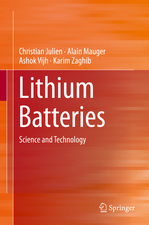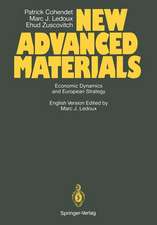The Economic Dynamics of Fuel Cell Technologies
Editat de Arman Avadikyan, Patrick Cohendet, Jean-Alain Hérauden Limba Engleză Hardback – 10 apr 2003
| Toate formatele și edițiile | Preț | Express |
|---|---|---|
| Paperback (1) | 638.11 lei 6-8 săpt. | |
| Springer Berlin, Heidelberg – 8 dec 2010 | 638.11 lei 6-8 săpt. | |
| Hardback (1) | 644.49 lei 6-8 săpt. | |
| Springer Berlin, Heidelberg – 10 apr 2003 | 644.49 lei 6-8 săpt. |
Preț: 644.49 lei
Preț vechi: 758.23 lei
-15% Nou
Puncte Express: 967
Preț estimativ în valută:
123.32€ • 128.77$ • 101.83£
123.32€ • 128.77$ • 101.83£
Carte tipărită la comandă
Livrare economică 15-29 aprilie
Preluare comenzi: 021 569.72.76
Specificații
ISBN-13: 9783540007487
ISBN-10: 3540007482
Pagini: 252
Ilustrații: X, 233 p.
Dimensiuni: 156 x 234 x 19 mm
Greutate: 0.53 kg
Ediția:2003
Editura: Springer Berlin, Heidelberg
Colecția Springer
Locul publicării:Berlin, Heidelberg, Germany
ISBN-10: 3540007482
Pagini: 252
Ilustrații: X, 233 p.
Dimensiuni: 156 x 234 x 19 mm
Greutate: 0.53 kg
Ediția:2003
Editura: Springer Berlin, Heidelberg
Colecția Springer
Locul publicării:Berlin, Heidelberg, Germany
Public țintă
ResearchCuprins
0. Introduction: the economic dynamics of fuel cell technologies.- 0.1. Specific characteristics of fuel cell technologies.- 0.2. The heterogeneity of the stakeholders.- 0.3. Two main roles of networks in shaping the evolution of emerging technologies.- 0.4. The confrontation of many networks.- 0.5. The central and complex role of public policy.- 0.6. Outline of the book.- 0.7. Conclusive remarks.- 0.8. References.- I Fuel cell technologies: diffusion perspectives and governance of an emerging innovation.- 1. A state-of-the-art of hydrogen and fuel cell technologies: diffusion perspectives and barriers.- 2. The future of fuel cells in a long term inter-technology competition framework.- 3. Rationales for co-operation between firms and States within an emerging radical innovation.- 4. Potential economic impacts of fuel cell technologies.- II Fuel cell vehicles: an international comparison of public-private programmes.- 5. The Partnership for a New Generation of Vehicles and the US DoE Transportation Fuel Cells Programme.- 6. Fuel cells in Canada: from entrepreneurship to innovation clustering.- 7. The Japanese R&D system in the field of fuel cell vehicles.- 8. Fuel cell R&D within the European Framework Programmes.- Contributing Authors.
Caracteristici
Presents a comprehensive analysis of economic aspects of fuel cell technology, a new and promising solution for power problems Includes supplementary material: sn.pub/extras




















